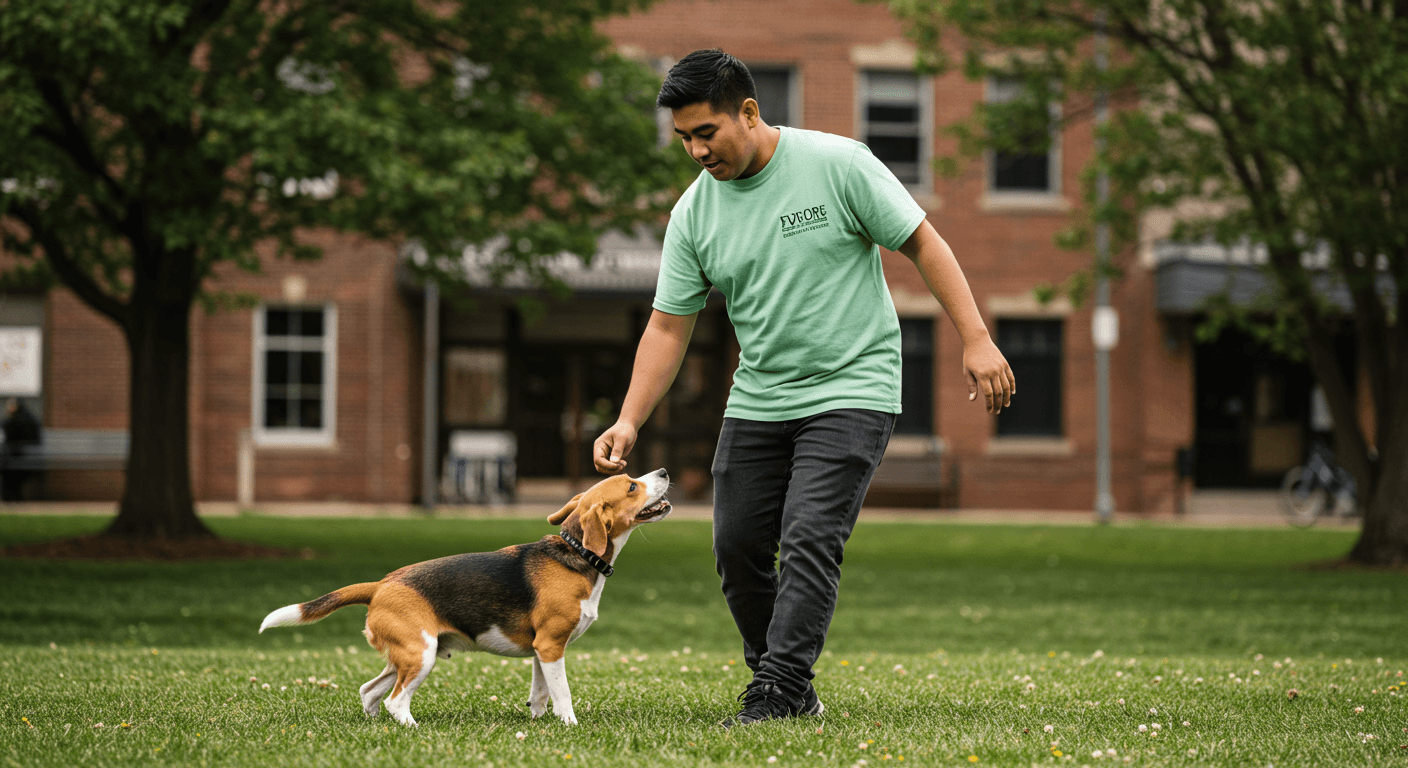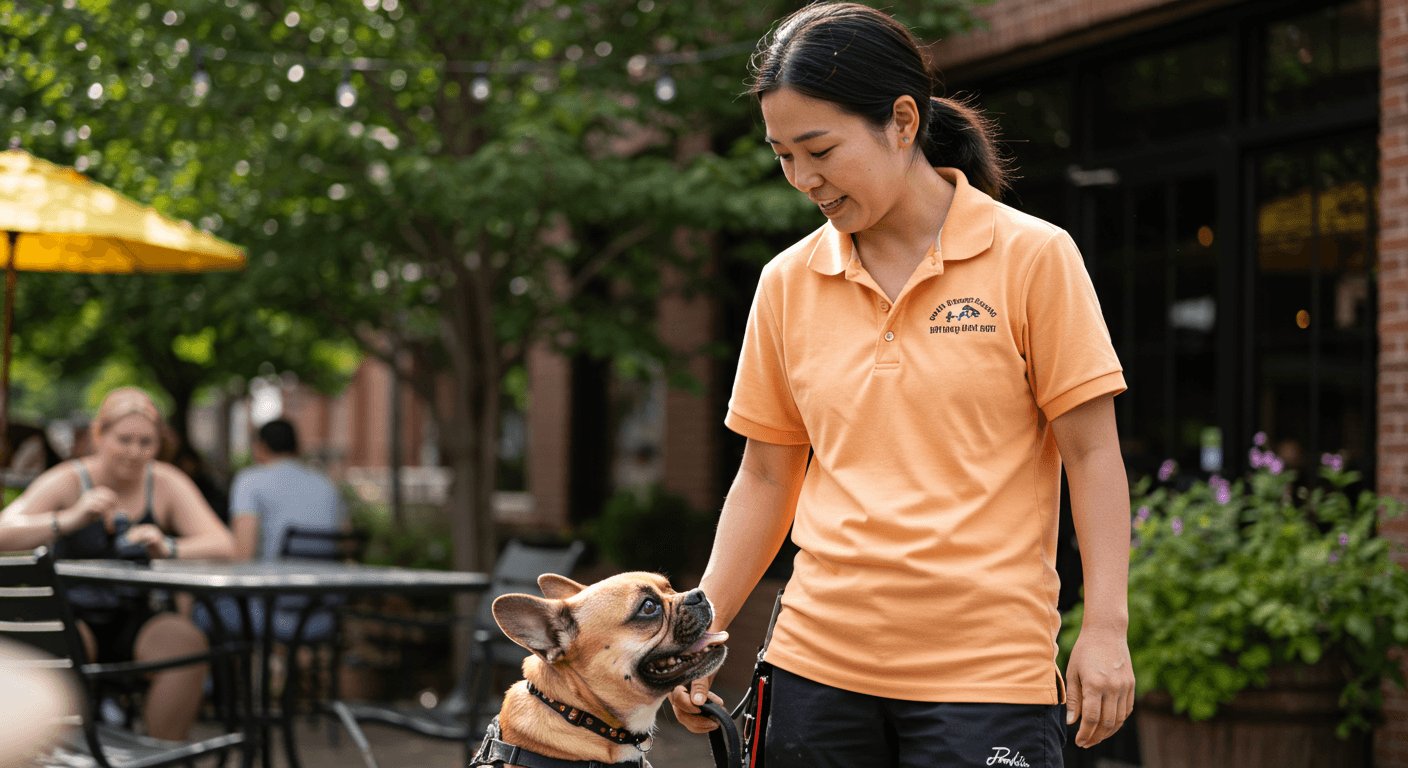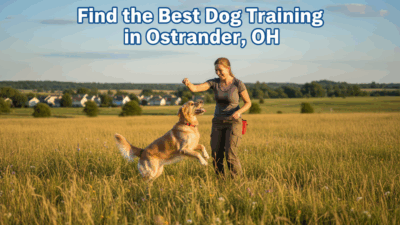Your Complete Guide to Choosing a Dog Trainer in Ostrander and Surrounding Areas
Living with a dog in Ostrander means you’ll be navigating a quiet, rural village where neighbors know each other and dogs are part of daily life. Your dog needs to handle greeting visitors on your front porch, walking calmly past livestock on nearby farms, and staying polite during trips to larger communities like Delaware for supplies and vet visits.
Since Ostrander sits in Delaware County, most local rules follow village and county guidelines. When you find a trainer who understands these rural community details, you’ll get better results both at home and out in your neighborhood.
How to Choose the Right Trainer
Start by looking for someone who uses positive reinforcement training and can set realistic goals for your Ostrander lifestyle. This means your dog should learn to stay calm around passing farm equipment, walk politely on quiet country roads, and handle the transition from your peaceful village to busier areas in Delaware or Columbus.
Credentials give you a quick way to compare trainers’ experience levels. Common dog trainer certifications include KPA-CTP, CPDT-KA, or IAABC-CDBC for behavior problems. If your dog has serious aggression issues, look for someone with CBCC-KA or a science-based program like CTC.
In-home dog training works great for puppy manners, door greetings, and rural property challenges like respecting boundaries with livestock or staying calm when delivery trucks arrive. Group classes make sense once your dog can focus around other dogs, though you’ll likely need to drive to nearby Delaware or Powell for these options.
Common Dog Training Methods Explained

Reward-based methods build the trust you want while creating lasting behavior changes. They also help you follow Delaware County’s rules about keeping dogs under control in public.
Basic obedience covers sit, down, stay, place, recall, and leash training so your dog can handle walks, store visits in Delaware, and social situations without pulling or jumping on people.
Puppy training focuses on socialization, potty training, bite control, crate comfort, and early leash skills. Starting with short, positive training sessions prevents bad habits from forming in the first place.
Behavior modification addresses fear, reactivity, resource guarding, or separation anxiety through careful desensitization and counterconditioning. For serious cases, ask if your trainer works with local veterinarians in Delaware or Lewis Center.
Private lessons and in-home sessions let you customize everything around your daily routines and the unique challenges of rural living. Day training can speed up results when you’re short on time or dealing with complex behavior issues.
Group classes help your dog practice good manners around other dogs and people. The best classes give dogs plenty of space, screen participants carefully, and teach calm behavior rather than just excitement.
Specialized training like therapy dog training or service dog training requires extra structure, public-access skills, and a very clear step-by-step training program.
Stay away from trainers who use fear, intimidation, or pain to get results. Humane methods are safer for everyone, easier to maintain long-term, and much better for keeping peace in a close-knit village community.
Average Cost of Dog Training in Ostrander OH and Surrounding Areas (Updated for 2025)
Prices around Ostrander and Delaware County depend on the trainer’s experience, how long sessions last, and travel distance from larger communities. Here’s what most local pet owners are paying in 2025.
| Service Type | Average Cost (Ostrander/Delaware County) |
|---|---|
| Puppy classes (4-6 weeks) | $140-$280 total |
| Group obedience classes (4-6 weeks) | $150-$295 total |
| Private lessons (60-90 min) | $100-$180 per session |
| In-home coaching packages (4-6 visits) | $400-$850 total |
| Day training (trainer works your dog + handoff) | $425-$900 per week |
| Behavior consult for reactivity/anxiety (initial) | $140-$240 |
| Board and train (2-4 weeks) | $1,900-$4,200 total |
You’ll probably pay extra travel fees since many professional dog trainers are based in Delaware, Powell, or Columbus and need to drive out to Ostrander. Expect higher rates for complex behavior work.
Make sure you understand what’s included, how the trainer tracks progress, and whether they offer a free consultation before you sign up.
Questions to Ask a Potential Dog Trainer
- What training methods do you use, and how do you keep training sessions positive and low-stress?
- What credentials do you have, like KPA-CTP or CPDT-KA? Do you keep up with continuing education such as CPDT-KSA?
- How will you customize the training program for my dog’s specific needs and our rural Ostrander lifestyle?
- Do you offer in-home visits, group classes, or day training, and which approach fits my goals best?
- How will we measure my dog’s progress and know when to add more distractions?
- What are the total costs, including any travel fees for coming to Ostrander, and what’s your cancellation policy?
- Do you carry liability insurance, and can you show me proof?
- For behavior problems, will you work with my veterinarian if needed?
- What should I practice between our sessions to help my dog keep improving?
Local Ostrander Rules and Considerations
Ostrander follows Delaware County regulations and Ohio state law to keep communities safe for everyone. Understanding these rules helps you train your dog properly.
Ohio doesn’t have a statewide leash law, but Delaware County and individual municipalities regulate dog control. In Ostrander, dogs must be kept under reasonable control at all times, which typically means leashed or confined to your property.
Ohio law requires current rabies vaccination for all dogs over three months old. You can get these through county clinics or your regular vet, and find more details through the Ohio Department of Health Rabies Program.
Dogs running at large or creating excessive noise can be considered a nuisance under Delaware County ordinances. Work with your trainer on recall training and alert barking before issues arise with neighbors.
If your trainer wants to use public spaces for commercial sessions, they may need permits and proof of insurance. Check with Delaware County or village officials before booking outdoor training in public areas.
Ohio doesn’t require special licenses for dog trainers, but if a business boards dogs for payment, the state’s Department of Agriculture oversees kennel licensing. You can find information through the Ohio Department of Agriculture Animal Health Division.
Delaware County Dog Warden handles animal control, lost pets, licensing, and other county resources. Their office can answer questions about local requirements and services.
Local Ostrander Resources for Dog Owners
These spots give you great places to practice polite manners, work on recalls, and provide safe enrichment for your dog. Always follow the posted rules and etiquette guidelines.
- Blue Limestone Park in Delaware features a fenced dog park where you can practice recalls and socialization in a safe environment. The park is about 15 minutes from Ostrander and offers separate areas for large and small dogs.
- Alum Creek State Park welcomes leashed dogs on most trails and picnic areas, giving you perfect opportunities to build focus around wildlife, families, and water distractions. The park is easily accessible from Ostrander.
- Olentangy Indian Caverns in Delaware County allows leashed dogs on the outdoor grounds, which can help with exposure to new environments and controlled socialization during quieter visiting times.

FAQs
How much does in-home dog training cost?
Most trainers serving Ostrander charge $100-$180 per in-home visit, with discounts available when you buy packages. Behavior problems typically start at the higher end of that range, and you may pay additional travel fees since expert dog trainers often come from Delaware or Columbus.
Is in-home dog training worth it?
Absolutely, because you’re working on problems exactly where they happen. Your trainer can fix door manners, jumping on guests, counter-surfing, and yard reactivity right at home, then step outside to practice leash skills on your actual country roads and property boundaries.
Can you pay someone to house train your dog?
Yes, many trainers offer puppy programs that include potty training, crate routines, and daily schedules. Day training can speed up the process while teaching you how to maintain the progress.
What is the 3-3-3 rule for dog training?
This is a helpful timeline for new or adopted dogs: expect about 3 days for your dog to decompress, 3 weeks to learn your routines, and 3 months to feel completely settled. Good training programs work with this natural adjustment period.
How long will it take to reach my training goals?
Most puppies and friendly adult dogs show solid progress within 4-8 weeks if you practice daily. Fear, reactivity, or separation anxiety typically requires several months of careful behavior modification with gradual increases in difficulty.
What should I bring to group classes?
Pack a flat collar or harness, a 6-foot leash, high-value treats, water, and current vaccination records if your trainer requests them. Leave retractable leashes at home for safety reasons.
What’s the leash law in Ostrander?
Dogs must be kept under reasonable control at all times, which generally means leashed in public areas or confined to your property. Delaware County enforces regulations against dogs running at large.
Do I need a dog license in Ostrander or Delaware County?
Yes, Delaware County requires dog licenses for all dogs over three months old. You can obtain licenses through the Delaware County Auditor's office, and you’ll need proof of current rabies vaccination.
What shots does my dog need in Delaware County or Ohio?
Rabies vaccination is required by Ohio state law for all dogs over three months old. Your veterinarian may also recommend distemper-parvo, bordetella, and leptospirosis based on your dog’s lifestyle and exposure to other animals.
Are dog trainers required to be licensed in Ostrander or Delaware County or Ohio?
No special trainer licenses exist in Ohio. Trainers follow normal business regulations, but if they offer board and train services, their facility may need to be licensed as a boarding kennel under the Ohio Department of Agriculture regulations.
Where can I practice off-leash recall?
Use fenced dog parks like Blue Limestone Park in Delaware to keep things safe and legal. Your own securely fenced property works perfectly for building a strong recall before testing it in more challenging environments.
Which dog parks allow training around Ostrander?
Blue Limestone Park in Delaware offers a fenced dog park with separate areas for different size dogs. This is the closest option to Ostrander and allows you to practice obedience training and socialization in a controlled off-leash environment.
What trails allow dogs for training?
Alum Creek State Park welcomes leashed dogs on most trails and near the beach areas, making it perfect for teaching calm focus around picnicking families, children, boats, and wildlife. The park’s variety of environments helps prepare your well-behaved dog for different situations.
How do I help my dog adjust to rural living?
Work with a certified dog trainer on controlled exposure to farm animals, loud equipment, and the transition between quiet country life and busier towns. Practice calm behavior around livestock fences and teach solid recall before allowing any off-leash time on your property.
What if my dog shows aggression toward livestock?
This requires immediate professional help from a trainer experienced with behavior modification. Keep your dog securely contained and leashed until you’ve worked through a structured training plan to address the reactivity.
The right combination of thoughtful planning, humane dog training services, and consistent practice around Ostrander’s quiet roads and nearby parks will help your dog become a confident, well-behaved companion. If credentials matter to you, don’t hesitate to ask about dog trainer certifications and how your trainer stays current with new techniques. Whether you need help with a new puppy or addressing challenges with an older dog, finding the right professional dog trainer makes all the difference in creating the partnership you want.
